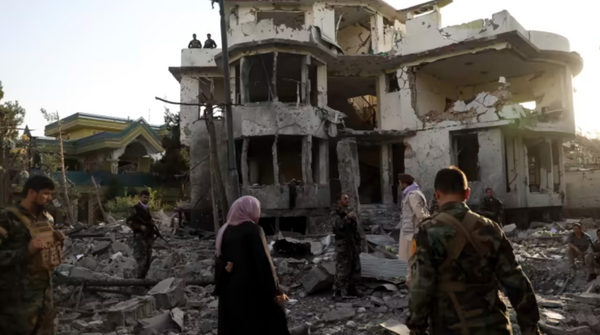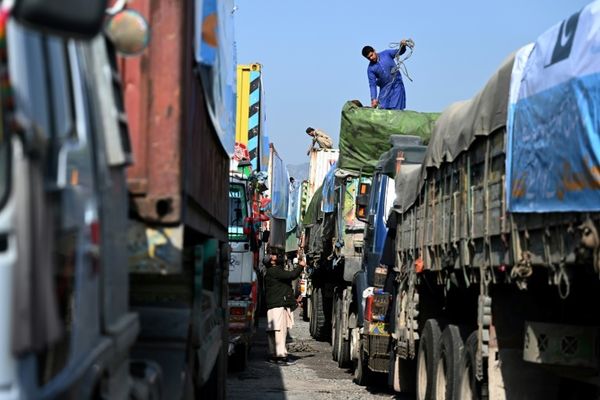
Western officials fear a UN pledging conference this Thursday aimed at raising more than $4.4bn (£3.34bn) aid for Afghanistan is likely to fall well short of its target. One UN official admitted he feared the Taliban’s increasingly repressive rule would lead to a donor backlash.
The new UN appeal, on top of the flash appeal for $600m in the immediate wake of the Taliban takeover in August, is hoping to raise the biggest sum ever for a single country at a pledging conference.
But the decision by the Taliban on 23 March to renege on a pledge to let girls above grade 6 return to education, leading to street protests, is likely to put many donors off.
The World Bank has put four projects in Afghanistan worth $600m from its reworked Afghan Reconstruction Trust Fund on hold until the position is clarified. Plans to pay teachers’ salaries through the fund are being reviewed, at least in the schools where older children are banned.
The UN estimates that about 10 million children across Afghanistan urgently need humanitarian assistance to survive.
The UK announced on Wednesday it was providing £286m this financial year, the same as last year, promising none of the money would go to reward the Taliban.
The sum was criticised by the former international development secretary Andrew Mitchell, who said the UK traditionally would have offered £325m, or 10% of the target. The UK is co-hosting the pledging event along with Germany, Qatar and the UN. Preparations for the event have been relatively brief, and a Yemen pledging event fell short.
Western aid formed 75% of the Afghan government budget before the Taliban took over.
It had been hoped the UN’s pledging conference would take place against an optimistic backdrop of older children having just started the new school year for the first time since the Taliban seized power, making international recognition of the Taliban a realistic objective.
Repeated assurances that older girls would be able to attend had been given to western officials, and Unicef agencies, right up to the start of the new school year, by those Taliban leaders that favour normalisation. But western officials now say they think their interlocutors were trying to ease through the reform in a low-key way, establishing facts on the ground, without the supreme leader, Haibatullah Akhundzada, being fully consulted.
Since then a raft of other repressive measures have been imposed over the transmission of western media, such as the BBC, as well as new requirements for men to wear beards if working in offices. Women have also been banned from travelling by air independently. Taliban determination to be able to direct or to tax humanitarian aid is also said to be rising.
Achim Steiner, the head of the United Nations Development Programme (UNDP), in Kabul this week warned further delays in starting classes not only harmed the girls’ futures, but risked Afghanistan being ignored.
“For us and the United Nations, this is a critical moment in which the world needs to understand Afghanistan,” he told reporters on Monday.
“But the leadership of Afghanistan must also recognise that the world can very easily turn to other crises.”
If there were any “technical constraints” in reopening the schools the UN would make it a top priority to resolve them, Steiner said.
“But if it were to signal a more fundamental reversal on this principle, it would indeed create I think a crisis in the way that both the international community and the country could relate to one another,” he said.
With the west’s influence hitting a roadblock, China looks to be jumping in. Yue Xiaoyong, China’s special envoy for Afghan affairs, will host a two-day meeting starting on Wednesday in Tunxi, in eastern China’s Anhui province, of foreign ministers of Afghanistan’s six neighbouring countries.
The acting foreign minister of the Afghan interim government, Amir Khan Muttaqi, is due to attend, as well as the Russian foreign minister, Sergei Lavrov. The Chinese foreign minister, Wang Yi, made a surprise visit to Kabul last week and stressed China “respects the religious beliefs and national customs of Afghanistan”, and “never interfered in Afghanistan’s internal affairs”.
The UN security council, through a resolution last year backed up by as many as seven US Treasury statements, has had some success in reassuring donors and aid agencies that it is possible to operate in the country without risk of US sanctions, but banks and finance houses remain nervous.
Diplomatic recognition of the Taliban, much more possible if the education for secondary-age girls had been allowed, now remains off the table, leaving the cloud of uncertainty about whether aid activity becomes sanctionable. The UN is still required to fund some of its activities by sending large suitcases of cash into Kabul.
A World Bank fund for Afghanistan has released £1.2bn for development work, and the Asian Development Bank has a $405m fund.










